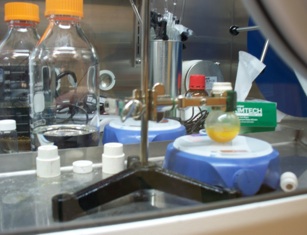 Brian Popp, assistant professor in the C. Eugene Bennett Department of Chemistry at West Virginia University, has been awarded an American Chemistry Society–Petroleum Research Fund Doctoral New Investigator Grant for his research on transition-metal-catalyzed reactions of petrochemical raw materials.
Brian Popp, assistant professor in the C. Eugene Bennett Department of Chemistry at West Virginia University, has been awarded an American Chemistry Society–Petroleum Research Fund Doctoral New Investigator Grant for his research on transition-metal-catalyzed reactions of petrochemical raw materials.
The grant, which is offered to professors with research groups at institutions offering doctorates in chemistry, is a form of “seed funding” to help launch their independent research careers.
“Petrochemicals are derived from a small fraction of every barrel of crude oil and serve as the starting materials for many consumer goods, including plastics, medicines, and some textile goods, to name only a few,” Popp said.
Most of the processes that transform petrochemicals into consumer goods employ a variety of catalytic reactions that use a catalyst that acts to “jump-start” the reaction and allows reactions to proceed that normally would not.
Popp’s research group focuses on reactions employing catalysts based on earth-abundant metals, like iron and cobalt, and precious metals, like rhodium, iridium and platinum.
The funded research is specifically focused on synthesizing new metal catalysts that are zwitterions, neutrally charged molecules with both a positive and negative electrical charge, to study how these catalysts affect how the petrochemical substrates react.
The area of zwitterionic-transition-metal catalysts, Popp said, is relatively unexplored and ripe with potential for discovery.
His ultimate goal, he added, is to develop the science of the catalysts and the corresponding catalytic reactions to be suitable for application in a variety of fields.
“Successful realization of this research program is expected to provide the foundation to transform multiple classes of petrochemicals into higher-value fine chemical and pharmaceutical products, an important objective for researchers in the various petrochemical fields,” Popp said.